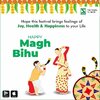Pongal pots and Sankranti kites,
Bihu songs and Lohri lights.
Fields of gold, hearts so bright,
India's joy in harvest's delight.
Pongal, Makar Sankranti, Bihu, and Lohri are some of the most vibrant and cherished harvest festivals celebrated across India, each reflecting the diverse cultural richness of the country.
Pongal: Celebrated in Tamil Nadu, Pongal is a four-day festival that expresses gratitude to nature, especially the Sun God, for a bountiful harvest. The sweet dish Pongal, made with rice, jaggery, and milk, is prepared as an offering, symbolizing prosperity and joy.

Makar Sankranti: Marking the Sun's transition into the zodiac of Capricorn (Makara), this festival is celebrated across India with regional variations. It symbolizes new beginnings, longer days, and the end of winter. People engage in kite flying, take holy dips in rivers, and enjoy festive treats like tilgul (sesame and jaggery sweets).

Bihu: Assam's harvest festival, celebrated as Magh Bihu or Bhogali Bihu, is a time of feasting, dancing, and community bonding. Traditional dishes like pithas and laddoos are prepared, and bonfires are lit to mark the end of the harvest season.

Lohri: Celebrated in Punjab, Lohri is a joyous festival that revolves around bonfires, dance, and music. It marks the harvest of sugarcane and the arrival of longer days. People gather around the bonfire, sing traditional songs, and offer sesame seeds, jaggery, and popcorn as a sign of gratitude.

These festivals not only celebrate the agricultural roots of India but also bring people together, fostering unity and joy amidst cultural diversity.
Bihu songs and Lohri lights.
Fields of gold, hearts so bright,
India's joy in harvest's delight.
Pongal, Makar Sankranti, Bihu, and Lohri are some of the most vibrant and cherished harvest festivals celebrated across India, each reflecting the diverse cultural richness of the country.
Pongal: Celebrated in Tamil Nadu, Pongal is a four-day festival that expresses gratitude to nature, especially the Sun God, for a bountiful harvest. The sweet dish Pongal, made with rice, jaggery, and milk, is prepared as an offering, symbolizing prosperity and joy.

Makar Sankranti: Marking the Sun's transition into the zodiac of Capricorn (Makara), this festival is celebrated across India with regional variations. It symbolizes new beginnings, longer days, and the end of winter. People engage in kite flying, take holy dips in rivers, and enjoy festive treats like tilgul (sesame and jaggery sweets).

Bihu: Assam's harvest festival, celebrated as Magh Bihu or Bhogali Bihu, is a time of feasting, dancing, and community bonding. Traditional dishes like pithas and laddoos are prepared, and bonfires are lit to mark the end of the harvest season.

Lohri: Celebrated in Punjab, Lohri is a joyous festival that revolves around bonfires, dance, and music. It marks the harvest of sugarcane and the arrival of longer days. People gather around the bonfire, sing traditional songs, and offer sesame seeds, jaggery, and popcorn as a sign of gratitude.

These festivals not only celebrate the agricultural roots of India but also bring people together, fostering unity and joy amidst cultural diversity.













 You wrote it so beautifully.
You wrote it so beautifully.
